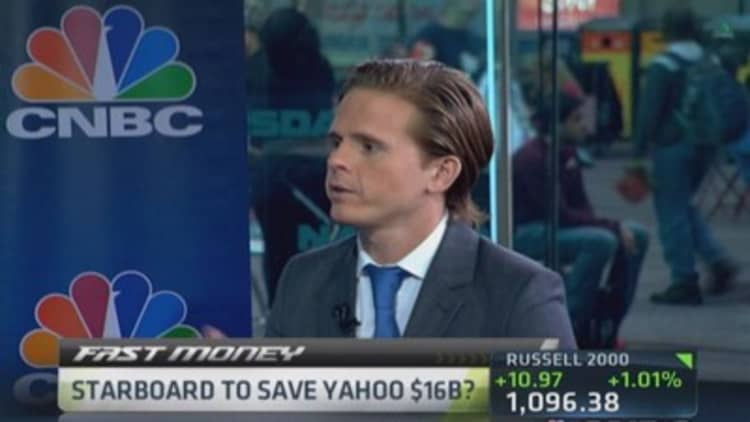
Starboard Value's specific plan for Yahoo Inc. is to spin off the company's core business, leaving behind the valuable stakes in Alibaba Group Holdings and Yahoo Japan as the main assets of the existing corporation, according to a person familiar with the activist hedge fund's thinking.
If Starboard succeeds—and there's no guarantee it will—Yahoo Inc. could be in the curious position of being a company, and stock, that no longer has anything to do with its original, core business.
Starboard, which announced a stake in Yahoo and called for its breakup last week, aims to achieve a number of objectives with such a plan.
First: Avoiding a big tax bill. The separation of the Alibaba and Yahoo Japan stakes would normally trigger an estimated $16 billion in taxes, according to Starboard's letter to the company last week.
However, by leaving those stakes within the existing company—and spinning off Yahoo's core assets into a separate company—Yahoo shareholders would not only avoid paying taxes, but the company's stock would be free of negative associations with Yahoo's current core business, the person said. (Yahoo Japan trades in Tokyo.)
Second, the structure would avoid violating a so-called lockup agreement that prevents Yahoo from selling its 15 percent stake in Alibaba. Under the lockup agreement, Yahoo isn't allowed to sell or spin off the Alibaba stake for one year after the Chinese company's IPO, which took place in mid-September.
The remaining company holding the Alibaba and Yahoo Japan stakes would also need to contain at least one "active trade" or business to satisfy U.S. tax rules. Such a business can be any normal operating concern such as one of Yahoo's fully owned Internet properties.
Yahoo's core business, which makes most of its revenue from search and display advertising, could be spun into a separate company that would trade as a separate stock, the person said. Alternatively, it could be merged with AOL as part of a single comprehensive transaction. If Yahoo's core business merged with AOL, Yahoo shareholders would need to wind up owning the majority of the combined company in order to receive favorable tax treatment.
Starboard's letter to Yahoo last week outlined its broad intentions for reorganizing the company but didn't go into specific details. The letter sparked questions about how Starboard would combine Yahoo with AOL and simultaneously extract value from the passive investment stakes. Starboard declined to comment to CNBC beyond the content of the original letter.
Read MoreActivist's plan aims to save Yahoo $16B in taxes
The structure Starboard envisions, known as a reverse Morris trust, has been used frequently by media industry mogul John Malone. The structure allows companies to harvest stakes in listed companies without triggering a tax bill. Malone used the structure to spin off a 54 percent stake in DirecTV several years ago without paying taxes.
While a merger between Yahoo's core business and AOL doesn't necessarily need to happen, it would effectively "kill two birds with one stone," the person said. In last week's letter, Starboard estimated it could achieve up to $1 billion in synergies by reducing cost overlaps in the display advertising businesses and at the corporate level.
One way to effect the merger would be for Yahoo's core business to issue new shares to AOL, with Yahoo shareholders owning the majority of the newly combined company. In the instance of a reverse Morris trust, AOL would issue shares in exchange for Yahoo's core business in a deal that left Yahoo shareholders with a majority stake in the combined entity. AOL declined to comment.
Starboard's plans for potentially separating the Alibaba and Yahoo Japan stakes is unclear. It's possible that Yahoo Japan could be spun off into a separate company, but such a transaction could occur at a later date, the person said.
A spokesman for Yahoo declined to comment, but Yahoo CEO Marissa Mayer said last week that the company would review Starboard's letter and looked forward to discussing it. In July, Yahoo CFO Ken Goldman said the company would "maximize long-term value for shareholders" in any deal involving the Alibaba stake.
Yahoo already sold part of its stake in Alibaba through the Chinese company's IPO last month. The stake generated about $9.4 billion in proceeds, but Yahoo will need to pay taxes on that amount. While Yahoo has said it would return at least half of the Alibaba proceeds to shareholders, Starboard would like to see all of it given back, according to the person familiar with Starboard's thinking.
Shares of Yahoo fell sharply in the days after the Alibaba IPO, but have recovered some of those losses since Starboard announced its stake last week.
Read More

